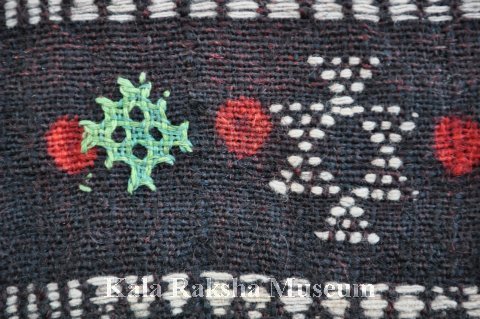|
Description
|
| MATERIALS: Wool cloth, cotton threads, mirrors and sequins. CONSTRUCTION: Hand woven bandhani, Machine embroidery, embroidered; square chain, cretan, interlaced, detached chain stitches and couched . MOTIFS: Chaini, phuldi, buttiwali thigdi. COLOURS : Multicoloured on black with red bandhni. STYLE REMARKS: This is the traditional pattern of decoration of a kachhi ludi: two thigadi are embroidered directly on the ludi in the centre and interlaced motifs are embroidered in each corner. In the late 1980's early 1990's, this went completely out of fashion. Today, women embroider elaborate thigadi on cercles or squares of synthetic or cotton fabric, and applique these to the ludi. Borders are decorated with metallic rick rack, sequins, etc. Machine embroidering of traditional Rabari motifs in a satin stitch zing zag has become popular due to saving of time. The machine artisans are usually Rabari themselves. CULTURAL SIGNIFICANCE: Laj, veiling before adult males of the in-laws, family, is a compulsory custom. The woolen ludi is woven loosely enough that it can be seen through. The woolen ludi is woven loosely enough that it can be seen through. The wool is a good insulator in extreme temperatures, is practical for sheep herders, and has been deemed holy as a reinforcement. the bandhani decoration is suhagadi (auspicious) and indicates that the wearer's husband is alive. CULTURAL REMARKS: Ludi are worn until they deteriorate, then recycled as quilts or stuffing of quilts. Since the style is long outdated, it was therefore difficult to find and example. This child's version emulates an adult woman's. The Dhebaria ludi was traditionally not embroidered. Today, it might be machine embroidered. The Vagadia version has bold motifs, a series of trapunto motifs up the seam, and densely embroidered borders. Ludaki, Girl's veil. |
Ludi
-Rabari Arts
-Copyright Statement

COPYRIGHT INFORMATION ~ When using this image, the credit information should be in the following format: Image courtesy of the Kala Raksha Museum.

COPYRIGHT INFORMATION ~ When using this image, the credit information should be in the following format: Image courtesy of the Kala Raksha Museum.